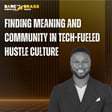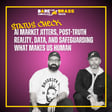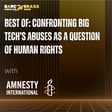
Confronting Big Tech’s Abuses as a Question of Human Rights
Hannah Storey, Advocacy and Policy Advisor at Amnesty International, joins the show to talk about her new brief that reframes Big Tech monopolies as a human rights crisis, not just a market competition problem.
This isn't about consumer choice or antitrust law. It's about how concentrated market power violates fundamental rights—freedom of expression, privacy, and the right to hold views without interference or manipulation.
Can you make a human rights case against Big Tech? Why civil society needed to stop asking these companies to fix themselves and start demanding structural change. What happens when regulation alone won't work because the companies have massive influence over the regulators?
Is Big Tech actually innovating anymore? Or are they just buying up competition and locking down alternatives? Does scale drive progress, or does it strangle it?
What would real accountability look like? Should companies be required to embed human rights due diligence into product development from the beginning?
Are we making the same mistakes with AI? Why is generative AI rolling forward without anyone asking about water usage for data centers, labor exploitation of data labelers, or discriminatory outcomes?
The goal isn't tweaking the current system—it's building a more diverse internet with actual options and less control by fewer companies.
If you've been tracking Big Tech issues in silos—privacy here, misinformation there, market dominance over here—this episode is an attempt to bring those conversations together in one framework.
Mentioned:
Read more about the Amnesty International report and download the full report here: “Breaking Up with Big Tech: a Human Rights-Based Argument for Tackling Big Tech’s Market Power”
Speech AI model helps preserve indigenous languages
Empire of AI, by Karen Hao



















